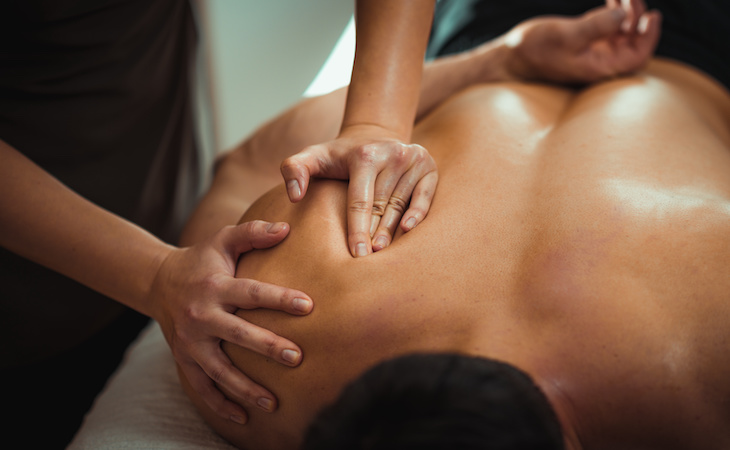Struggling to fall asleep at night? Getting a massage may help. Research shows that getting a massage isn’t just relaxing in the moment—it can also improve your sleep and overall health.
“Common ailments are often made up of many symptoms that affect the mind and body,” says Bianca R. Smith, a licensed massage therapist in Las Vegas.
Massage therapy tends to both your body and your mind—and the tension release and relaxation can work wonders for a variety of sleep conditions, from insomnia to restless legs syndrome (RLS).
Read on to learn more about the sleep and health benefits of massage.
Benefits of massage for sleep and health
“Regular massage therapy provides relief to those suffering from insomnia, chronic back pain, and sleep apnea,” Smith says. “Studies have shown that massage therapy reduces muscle stiffness and soreness, aids in controlling headaches, manages chronic pain, and promotes stress relief.”
1. Helps fight insomnia
Massage can significantly impact your ability to fall and stay asleep. That’s because massage soothes many of the factors that contribute to insomnia: stress, anxiety, pain, and tension.
Research shows cortisol, the “stress hormone,” decreases after a massage, while dopamine, the neurotransmitter that triggers a sense of well-being, increases. Sounds like a recipe for a snooze!
2. Soothes pain
Different types of massage therapy relieve different types of pain. Is your back sore after sitting for too long? A deep tissue massage can reduce the muscle tension. A stretching sports massage may be more effective if you’re sore the day after running a race.
Regular massages may also help with more general pain relief. “A manual lymphatic drainage (MLD) massage can promote short-term blood flow, which has been found to increase pain tolerance in healthy individuals,” explains Smith.
3. Improves sleep apnea
There’s some evidence that massage therapy may help improve sleep apnea. A 2019 study of 20 people with obstructive sleep apnea found that symptoms improved when patients received tui na (Chinese medical massage) for 15 minutes twice a week for 10 weeks. Their rapid eye movement (REM) stages of sleep also showed significant improvement.
4. Reduces symptoms of restless legs syndrome
A 2022 research review found that massage can help reduce symptoms of RLS. Massage with lavender oil reduced symptom severity even more.
Professional massage with aromatherapy may be the most effective massage treatment, but a 2007 study found that even twice weekly self-massage of the lower legs can ease leg tingling and sleeplessness.
5. Relieves migraine
A 2023 study of women with migraine found that connective tissue massage—a type of deep, full-body massage—helped relieve all migraine symptoms except vomiting. Massages were especially useful for reducing the pain associated with migraine headaches.
6. Decreases stress
Most people associate massages with relaxation—and for good reason! Massage therapy helps reduce stress by slowing your heart rate, reducing blood pressure, and decreasing stress hormone levels.
The best type of massage for better sleep
If you’re getting a massage for better sleep, then Smith suggests booking a Shiatsu or aromatherapy massage.
Shiatsu is a Japanese form of bodywork. ‘Shi’ means finger and ‘atsu’ means pressure, according to Smith. In Shiatsu massage, a trained therapist applies finger pressure to a fully clothed client in a systematic pattern designed to restore balance.
If you prefer a more traditional sleep-promoting massage, then try a Swedish massage with aromatherapy.
“Studies show that aromatherapy calms anxiety and influences sleep quality nearly instantaneously,” adds Smith.
Wondering which scent to choose? Science says lavender can improve sleep quality and lower blood pressure.
How to add massage to your sleep routine
Adding massage to your sleep routine doesn’t have to be complicated. The best way to ensure massage therapy helps you achieve your sleep goals is to get regular massages, says Smith.
The National Center for Complementary and Integrative Health suggests massage therapy offers mostly short-term health benefits. That could mean the sleep benefits of weekly massage are better than those of monthly massage.
Of course, not all massage therapies are the same. A trained massage therapist can help pinpoint the best frequency and type of massage therapy for your health goals.
You can also learn basic self-massage techniques or use at-home devices such as a massage gun or massage chair to relax and relieve muscle tension.
FAQs
Does a massage help you sleep better?
Yes—massage can relax your body and mind, which will help you sleep better.
Is a massage the equivalent of eight hours of sleep?
There are many different types of massage therapy. You may feel like you’ve just slept for eight hours after a Swedish massage with aromatherapy. But a deep tissue massage that targets painfully knotted muscles? That might feel more like the equivalent of a gym session than a nap.
Why do massages make me sleep?
Massages can relieve muscle tension and pain and relax your body and mind. All of these effects help promote rest and sleep.
Is it good to fall asleep during a massage?
Falling asleep during a massage is absolutely fine. Your therapist may even consider it a good sign that the therapy has relaxed you.
Reflexology is another form of bodywork that may help you catch Z’s. Learn about the sleep and health benefits of reflexology.




